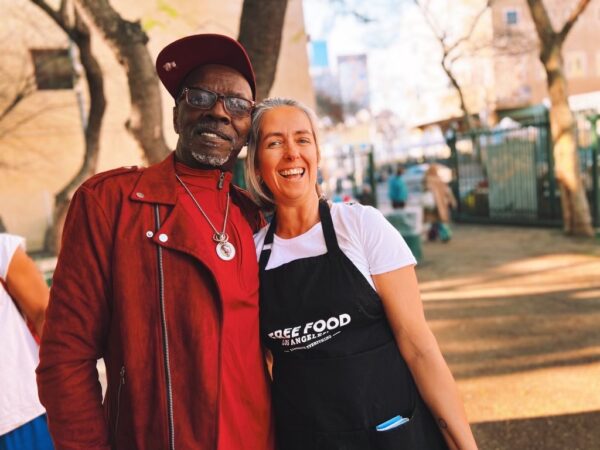by Kate Wiggs
A volunteer with Free Food Los Angeles, Kate has been working in mental health since 2012–mostly as a family art therapist. She says chopping onions is the best meditation she knows of.
We were looking around for inspiration for the weekly Free Food meal. I felt inspired to offer some time and turn the many pounds of donated ingredients into a Bolognese sauce. My motives were largely selfish, after a lot of traveling, I was hoping to bring myself back down to earth with some heartfelt home cooking. Also, my Nonna’s recipe hadn’t been recreated in a while, and I loved the thought of sharing the method that I had learned, standing on a stool in her East London kitchen, while she blasted out Puccini on her brown portable cassette player. I wanted to bring some of her energy and passion into the Free Food project. That Nonna was herself a Bolognese (having grown up in Bologna) made her recipe all the more authentic, and I was pretty sure our guests would appreciate it.
My first realization as an enthusiastic amateur is how food preparation changes when cooking on a larger scale than usual. I started organizing things as I would in my kitchen at home and then realized that everything needed to be bigger: the pots, the pans, the chopping boards, even the initial glug of olive oil before browning the onions.
My second realization was how much longer everything takes, even the swapping out of the medium pans for the giant ones takes time, and I clean as I go. Our small kitchen space wouldn’t allow for piles of unused dishes. But even this has a rhythm to it, and soon, everything is organized, and it’s time to start my favorite stage: the chopping meditation.
I love all the steps of cooking: the planning, watching how the ingredients gradually transform, even the cleaning up afterwards, but my favorite part is the chopping. Time alters for me in this stage, my mind goes very quiet, and I become completely absorbed in where my hands meet the cutting blade. I love to set the station up just right, so that I can really lose myself in what is happening; it’s quite the meditation. Then I blink back to reality, realizing that the huge pile of raw materials in front of me has disappeared. I look over at the bowl of prepared vegetables. ‘Woah,’ my mind remarks, ‘that’s a lot of onions!’ And the task of cooking and adding the various parts, one by one, begins, as the sauce starts to come together.
I start frying the onions and realize that a good couple of hours have gone by already! As everything is bigger, the interaction between the food and the cooking surfaces is different from what I have been used to. Eyeing the fifteen pounds of chopped onions, I start to feel a little intimidated and call on friends for support. Luckily, everything we do at Free Food is done as a team and my determination to see Nonna’s recipe recreated in a loving way keeps me motivated, so we carry on, past the time of my usual yoga class, and late into the evening. A total of eight hours goes into that Bolognese and a tremendous sense of satisfaction that we are creating food with love, in order that it can be served with dignity to our guests.
In the last moments of the night, I reflect upon how grateful I am to have somewhere to pour out this part of me that would have little place else to go. My adult sons don’t need me as they once did, and yet the creative energy still seeks for a channel, so I am grateful to our repeat guests, who come back week after week, to help bring the overflow to a healthy balance. In this way, Free Food completes the circle, and we all receive nourishment from one another, and thank god for that.

 Get access to the monthly Rehumanization Magazine featuring contributors from the front lines of this effort—those living on Death Row, residents of the largest women’s prison in the world, renowned ecologists, the food insecure, and veteran correctional officers alike.
Get access to the monthly Rehumanization Magazine featuring contributors from the front lines of this effort—those living on Death Row, residents of the largest women’s prison in the world, renowned ecologists, the food insecure, and veteran correctional officers alike.